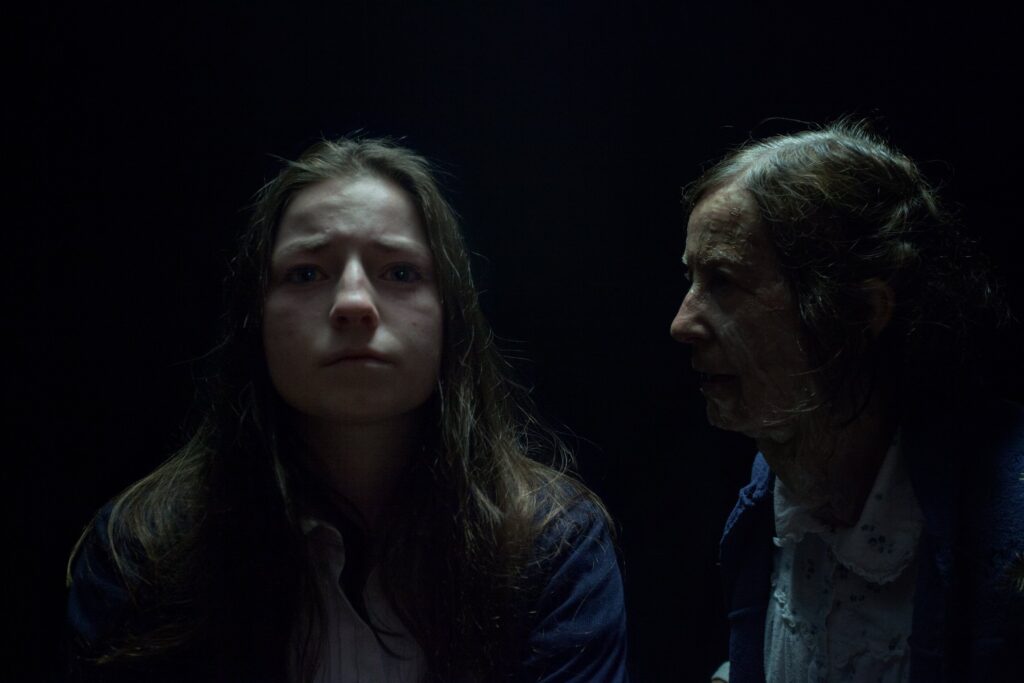April 25, 2022
by Carla Hay

Directed by Kate Dolan
Culture Representation: Taking place in North Dublin, the horror film “You Are Not My Mother” features a nearly all-white cast of characters (with a few black people) representing the working-class and middle-class.
Culture Clash: After a single mother mysteriously vanishes for a few days, she comes back to her home and seems to be a strange and different person, and her teenage daughter begins to wonder if this mother is possessed by something evil.
Culture Audience: “You Are Not My Mother” will appeal primarily to people who are interested in predictable but effective horror movies about the supernatural.

“You Are Not My Mother” has a mystery that’s very easy to solve, but this well-acted horror movie adeptly maintains suspense in a story influenced by Irish folklore. It’s a solid feature-film directorial debut from Kate Dolan, who also wrote “You Are Not My Mother.” The movie should satisfy people who like supernatural thrillers that can be frightful but don’t wallow in a lot of bloody gore. “You Are Not My Mother” had its world premiere at the 2021 Toronto International Film Festival.
In “You Are Not My Mother” (which takes place in North Dublin), teenager Char Delaney (played by Hazel Doupe) is an introverted loner who attends an all-girls Catholic school. Char is about 15 or 16 years old. Char lives with her single mother Angela Delaney (played by Carolyn Bracken), Angela’s brother Aaron (played by Paul Reid), and Char’s grandmother Rita (played by Ingrid Craigie), who is the mother of Angela and Aaron. Char’s biological father is not seen or mentioned in the move.
“You Are Not My Mother” opens with a scene in the woods, where a baby (played by Dante Woods) is being taken by Rita, who lights a circular fire around the baby. The baby then apparently burns to death. Why would Rita do such a horrible thing? By opening the movie with this scene, writer/director Dolan foreshadows too much of the movie too early. Within the first 10 minutes of the film, it’s obvious that Char’s family has secrets that will eventually be revealed.
Angela has had a long history of depression. In the beginning of the movie, her depression is so debilitating, she is frequently bedridden. One day, Char asks her grandmother Rita for money to take a bus back home from school. Rita says in response: “Why don’t you ask your mother? I’ll get her out of bed.”
Angela manages to get out of bed, and she gives Char a ride to school. However, Angela seems so distracted, Angela almost hits a horse on the road with her car. Meanwhile, Char says, “Mum, we need food in the house. Mum, what’s wrong with you?”
Angela, who seems exhausted and sad, replies: “I’m sorry. I don’t think I can do this anymore.” When Char comes home from school, her mother isn’t there. Later, Char finds her mother’s car abandoned in a field, with a bag of groceries left on the front passenger seat. Angela is nowhere in sight.
Angela’s concerned family eventually contacts the local police to report her missing. Aaron is very concerned that Angela could’ve been kidnapped. A policewoman named Officer Jenny (played Aoife Spratt) has come to the home to take the missing person report. Aaron gets impatient and angry when it’s suggested that, because of Angela’s history of depression, she might have left to go somewhere on her own for a while. Later, Char has a nightmare about finding her mother dead.
When Char’s mother goes missing, it’s just another stress in Char’s life. At school, she is bullied by a group of “mean girls,” led by a snooty brat named Suzanne O’Connell (played by Jordanne Jones), who has her own mother issues that are later revealed in the story. Two of the other girls in this “mean girls” clique are named Kelly (played by Katie White) and Amanda (played by Florence Adebambo), and they later participate with Suzanne in a very cruel prank on Char.
In one of the movie’s classroom scenes, Char is first seen having to interact with Suzanne, who reacts with annoyance when art teacher Ms. Devlin (played Jade Jordan) tells Suzanne to sit next to Char. When the teacher isn’t looking, Suzanne takes some gum out of her mouth and smears the gum on Char’s notes. Char is considered an outcast at this school because she comes from a working-class family who is considered a little strange.
Later in the art class, Char shows Ms. Devlin a drawing that Char made of shadows engulfed in flames. Char tells the teacher that she made the illustration from a dream that she had. It’s a very cliché and obvious clue in the movie.
Another clue is when after Angela goes missing, Rita gives Char a small ball of twigs and leaves, while saying, “I made this for you—for protection.” Why does Char need to be protected? Could it have anything to do with that apparent birthmark on her face?
At any rate, Angela eventually returns to the home after a few days, with no explanation of where she went and why. However, Char and the other family members notice that Angela is not the same person she was before Angela disappeared. This new Angela is more energetic and in better spirits. She even starts doing things like cheerfully making dinner. It’s close to Halloween, so the meal includes pumpkin.
But this new Angela now has a loss of appetite. And this mother, who was once so listless that she could barely get out of bed, is now enthusiastically talking about taking a mother-daughter trip with Char. It’s an idea that Aaron vehemently opposes.
“You Are Not My Mother” is much more of a psychological horror film than a movie that relies on a lot of action-packed jump scares. There are some moments that are meant to induce terror, but a lot of the horror is about what can’t be seen rather than the story being about a killer on the loose. This movie could’ve benefited from more character development, but “You Are Not My Mother” also doesn’t clutter the movie with a lot of unnecessary scenes.
All of the cast members give reasonably authentic performances, but the horror merits of “You Are Not My Mother” are mostly in Bracken’s eerie transformation as Angela. Without this unsettling performance, “You Are Not My Mother” would just be an average or laughable horror movie if mishandled by someone who was miscast in the Angela role. (Fun fact: Writer/director Dolan appears briefly in the movie in the role of a pharmacist.) “You Are Not My Mother” is not a going to be considered a classic horror movie, but it delivers plenty of intrigue for horror fans who are looking for a thriller that explores issues of generational trauma and family burdens.
Magnet Releasing released “You Are Not My Mother” in select U.S. cinemas, on digital and VOD on March 25, 2022.
